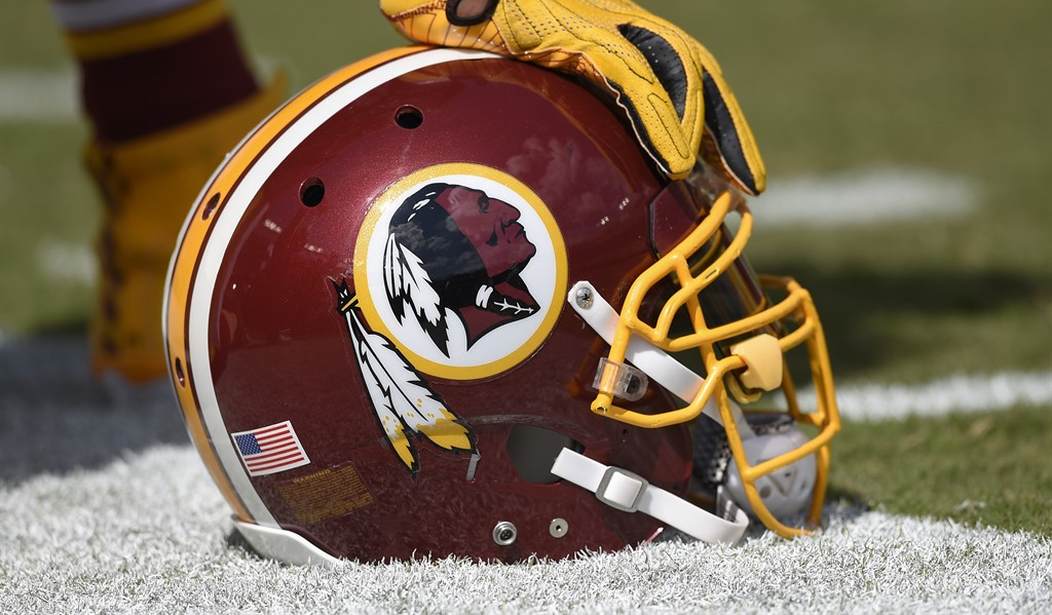The federal government’s efforts to force Washington’s NFL franchise to change its name have come to an abrupt halt. After a unanimous Supreme Court decision last week in Matal v Tam rebuked the Patent and Trademark Office for violating the First Amendment in refusing to process trademarks it found offensive, the Department of Justice has surrendered to the Redskins:
The Justice Department is giving up the legal fight over the name of the Washington Redskins.
In a letter to a federal appeals court, the department said last week’s Supreme Court decision in Matal v. Tam in favor of an Asian-American band calling itself the Slants means the NFL team will prevail in a legal battle to cancel the team’s trademarks because the name is disparaging to Native Americans.
“Consistent with Tam, the Court should reverse the judgment of the district court and remand the case with instructions to enter judgment in favor of Pro-Football,” Mark Freeman, an attorney for the Justice Department’s civil division, wrote to the Richmond, Virginia-based 4th Circuit Court of Appeals.
The effort from the USPTO and the DoJ wouldn’t have directly forced a name change, but would have stripped the Redskins of their ability to protect the name and likely the logo in its merchandising. That could have eventually led to losses in revenue opportunities that might have run into the millions of dollars, although as the court noted, there are still other legal protections that are available (if less effective) than a USPTO trademark. Whether owner Dan Snyder could have sustained that loss is a real question, although he has repeatedly insisted that the team will never change names under his ownership.
With the unanimous Tam decision in hand, the DoJ would have lost in the next round of the case anyway. (One important aspect of the Tam decision for the Redskins’ case was the finding that the First Amendment covers language in trademarks that might be offensive to broad categories of persons, not just specific people, and does not require the filer to be a member of those categories.) One has to wonder just how far this DoJ would have pursued it anyway. Donald Trump won office by hammering political correctness, and Jeff Sessions might have decided that his attorneys have better things to do than help the USPTO interfere in Snyder’s business to enforce a PC solution to the controversy. However, imagine the outcry and the media coverage if Sessions had ordered the reversal without Tam in hand — especially after some of the cheap shots leveled at Sessions during his confirmation hearing. It would have been brutal.
In that sense, the Supreme Court let Sessions and the DoJ off the hook — and they wasted little time in taking advantage of it. The court’s rebuke should remind activists in future administrations that the DoJ has better things to do than to try to impose speech restrictions on entities whose speech offends some, and in fact should be defending speech in those cases, no matter how distasteful. The court reminded the petitioners of the words of Justice Oliver Wendell Holmes in a dissent from 1929’s US v Schwimmer:
It is claimed that the disparagement clause serves two interests. The first is phrased in a variety of ways in the briefs. Echoing language in one of the opinions below, the Government asserts an interest in preventing “‘underrepresented groups’” from being “‘bombarded with demeaning messages in commercial advertising.’” Brief for Petitioner 48 (quoting 808 F.3d, at 1364 (Dyk, J., concurring in part and dissenting in part)). An amicus supporting the Government refers to “encouraging racial tolerance and protecting the privacy and welfare of individuals.” Brief for Native American Organizations as Amici Curiae 21. But no matter how the point is phrased, its unmistakable thrust is this: The Government has an interest in preventing speech expressing ideas that offend. And, as we have explained, that idea strikes at the heart of the First Amendment. Speech that demeans on the basis of race, ethnicity, gender, religion, age, disability, or any other similar ground is hateful; but the proudest boast of our free speech jurisprudence is that we protect the freedom to express “the thought that we hate.”
Note that this doesn’t address the criticisms of the name, or the criticisms of the criticisms, all or none of which may be legitimate or correct. What Tam does, and what the DoJ’s actions belatedly acknowledge, is that the best antidote to bad speech is more speech; the best antidote to bad commercial speech is consumer choice. The worst outcome is handing those in power the authority to silence or punish speech they don’t like. In the future, let’s have a DoJ that defends free speech and the First Amendment from the mobs, rather than assist in censoring speech to enforce whatever political consensus exists at the moment. Anything else allows government to shut down speech with any flimsy excuse, and that kind of power will never be limited to sports-team merchandising.
Update: It’s worth noting that the DoJ was only one party to this effort, and not in the lead. The lead plaintiffs (Amanda Blackhourse et al) filed yesterday to end the case, too. Thanks to Desmond Lee for the heads-up.







Join the conversation as a VIP Member